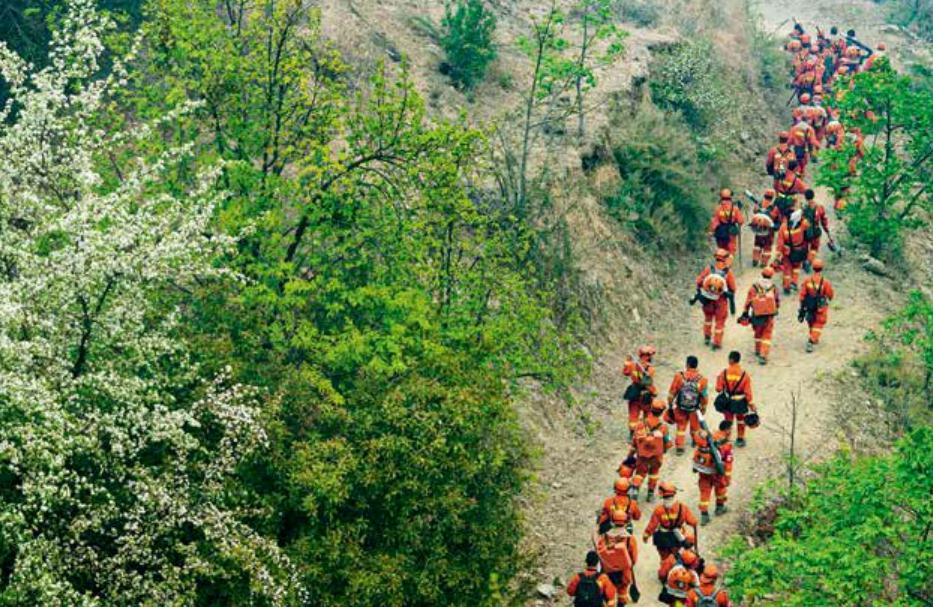Fiery Liangshan Spring
2020-08-10byChengXueli
by Cheng Xueli


A native of Yunnan Province, 26-year-old Wang Shunhua has been working for the Liangshan division of the Sichuan forest fire services in Liangshan Yi Autonomous Prefecture, southwestern Chinas Sichuan Province for nearly eight years. As head of the No. 3 team of the No. 4 squadron of Xichang detachment under the Liangshan division, he has climbed thousands of mountains and crossed vast stretches of virgin forest. He and his coworkers risk their lives to protect green mountains.
“Muli Again”
On the afternoon of March 28, 2020, a wildfire broke out at the junction of Xichang Citys Youjun Town and Yanyuan Countys Jinhe Township. The Xichang detachment of the Sichuan forest fire services was ordered to get to the site by the morning of March 29. Long Qian, a rookie in Wang Shunhuas team, was a bit excited. He followed Wang around with questions about putting out fires.
Long is a native of Liangshan in Sichuan. In his childhood, on the first day of every New Year, his father went to the village committee to attend training on forest fire prevention and control and brought home a signed and fingerprinted fire safety certification. He fondly recalls his father posting it on the most conspicuous place on the door of their home. “You should never bring fire when you go out,” his father warned Long and his younger brother. “If you start a forest fire, you will go to jail.”
The wildfire was extinguished on March 29. When the firefighters headed down the hill with their fire extinguishing equipment, they expected a good rest at the base camp. With no cell phone signal on the mountain, no one knew that another forest fire had broken out in Muli, a Tibetan autonomous county in Liangshan. Soon, Wangs detachment was heading directly to Muli as reinforcements. “Muli again,”Wang sighed.
Located on the southwestern edge of Sichuan Province, Muli Tibetan Autonomous County is administered by Liangshan. On March 30, 2019, a forest fire started by lightning broke out in an area 3,800 meters above sea level in Muli that features complicated topography, steep slopes and deep valleys and lacks transport and communication infrastructure. All these made it difficult to put out the fire. Wang has never forgotten that battle involving five helicopters dropping water and providing surveillance and around 700 firefighters on the ground. He lost 27 colleagues as close as brothers fighting alongside him.
While at the division station, Wang sometimes visits the Xichang martyrs cemetery to mourn for late squadron leader Zhang Hao. Before the March 2019 fire in Muli, 29-year-old Zhang had fought fires with Wang for more than three years. If not for the devastating fire this year, Wang would have joined his fellow firefighters to visit Zhangs tomb at the martyrs cemetery on March 30.
The battle continued because the fire was still fierce. On the night of March 31, as the blaze on the southern line was basically contained, the situation on the northern line became the prime concern as the fire was creeping towards a primitive forest. After days deep in the mountains, Wang gradually adapted to the new way of life. His sense of time simplified to only day and night, and the only thing on his mind was putting out the fire. One night, while sitting in the camp with the wind roaring, Wang suddenly felt wetness on his face. “Its snowing!” Someone shouted, electrifying the whole camp. Everyone stood up and cheered to the sky. “This is great!” Wang thought. “Now it will be much easier to extinguish the fire.”
On Wangs 10th day in Muli, the forest fire was finally eliminated thanks to joint efforts of the Sichuan forest fire services, the Fire and Rescue Department of Sichuan Province, and the local firefighting force. Upon learning that his team could leave, Wang had only one thought: “I dont want to ever see a fire break out again.” Thanks to Wang and his fellow firefighters, most of the wild flowers in the mountains survived the blaze. Wangs one wish for Liangshan is that the next spring will be nicer. “I hope spring brings only flowers and trees, instead of smoke and fire.”
